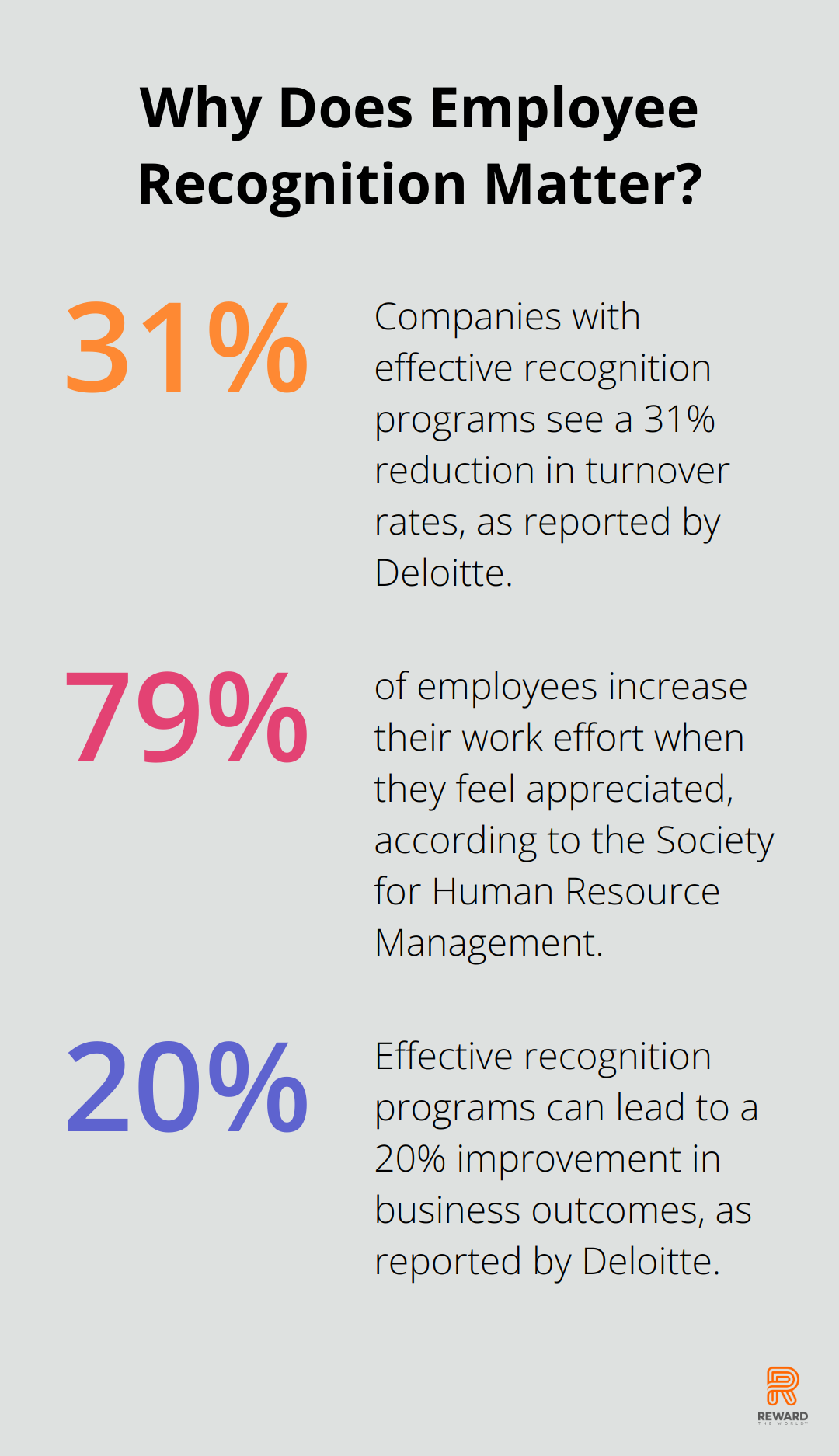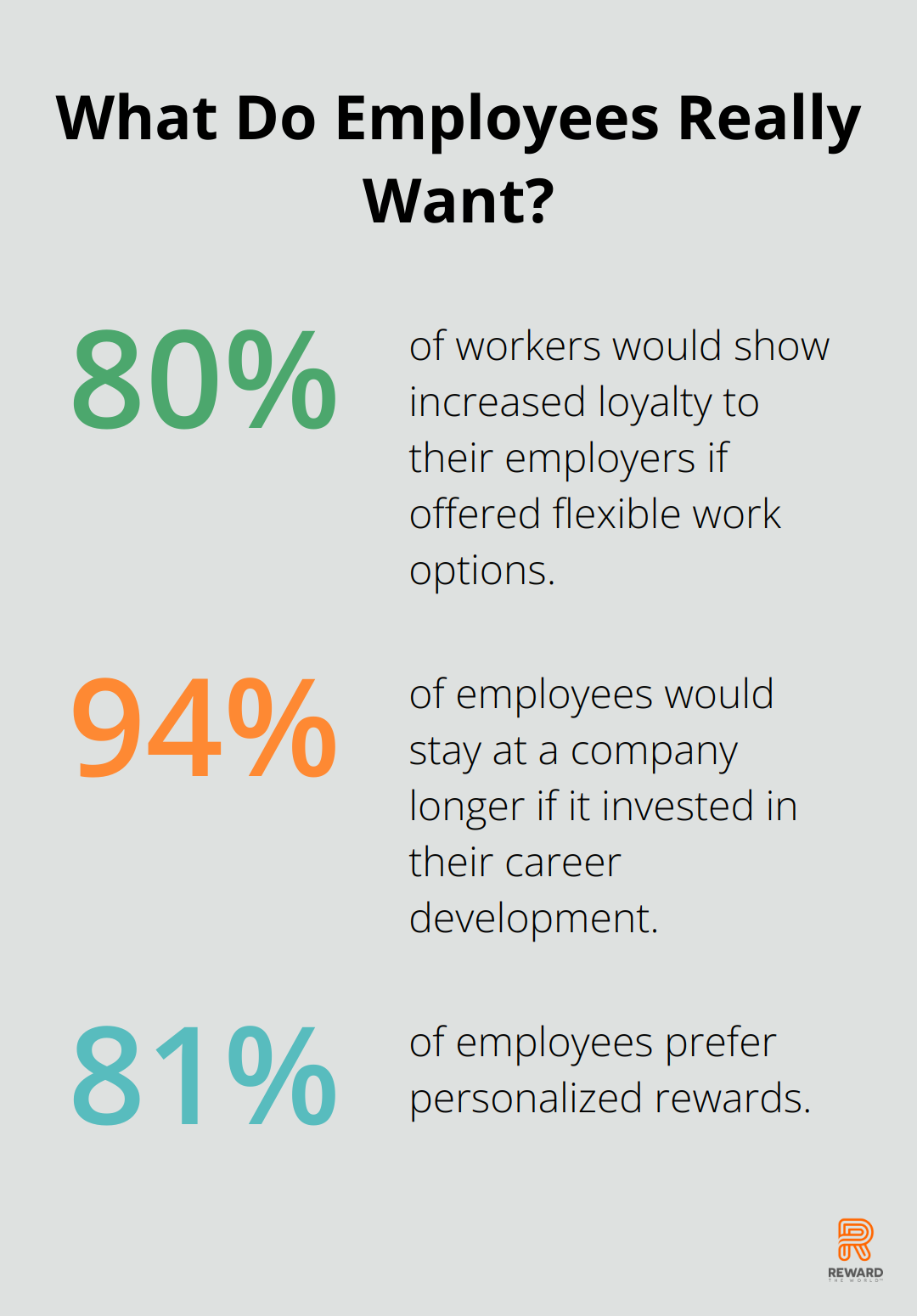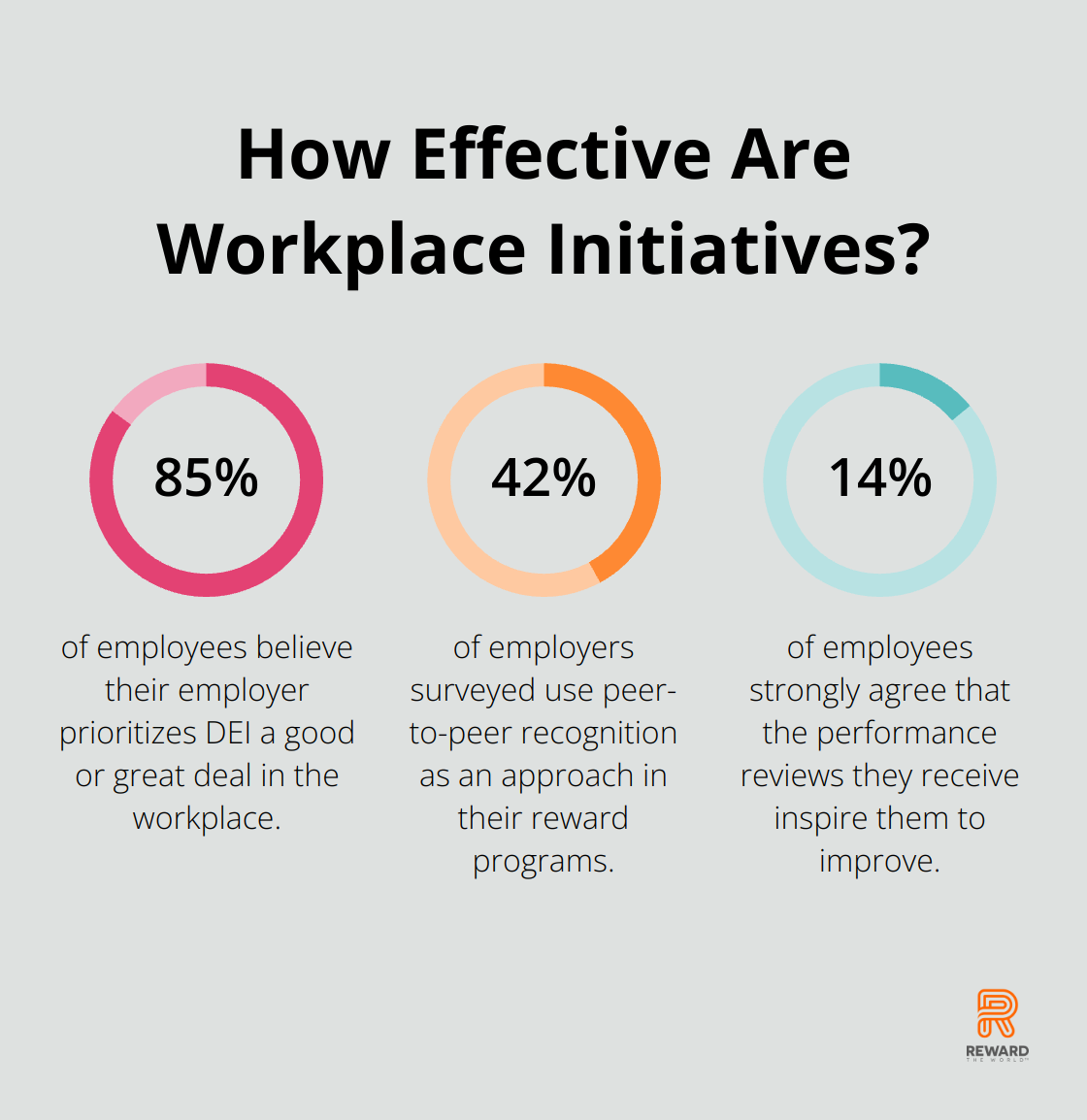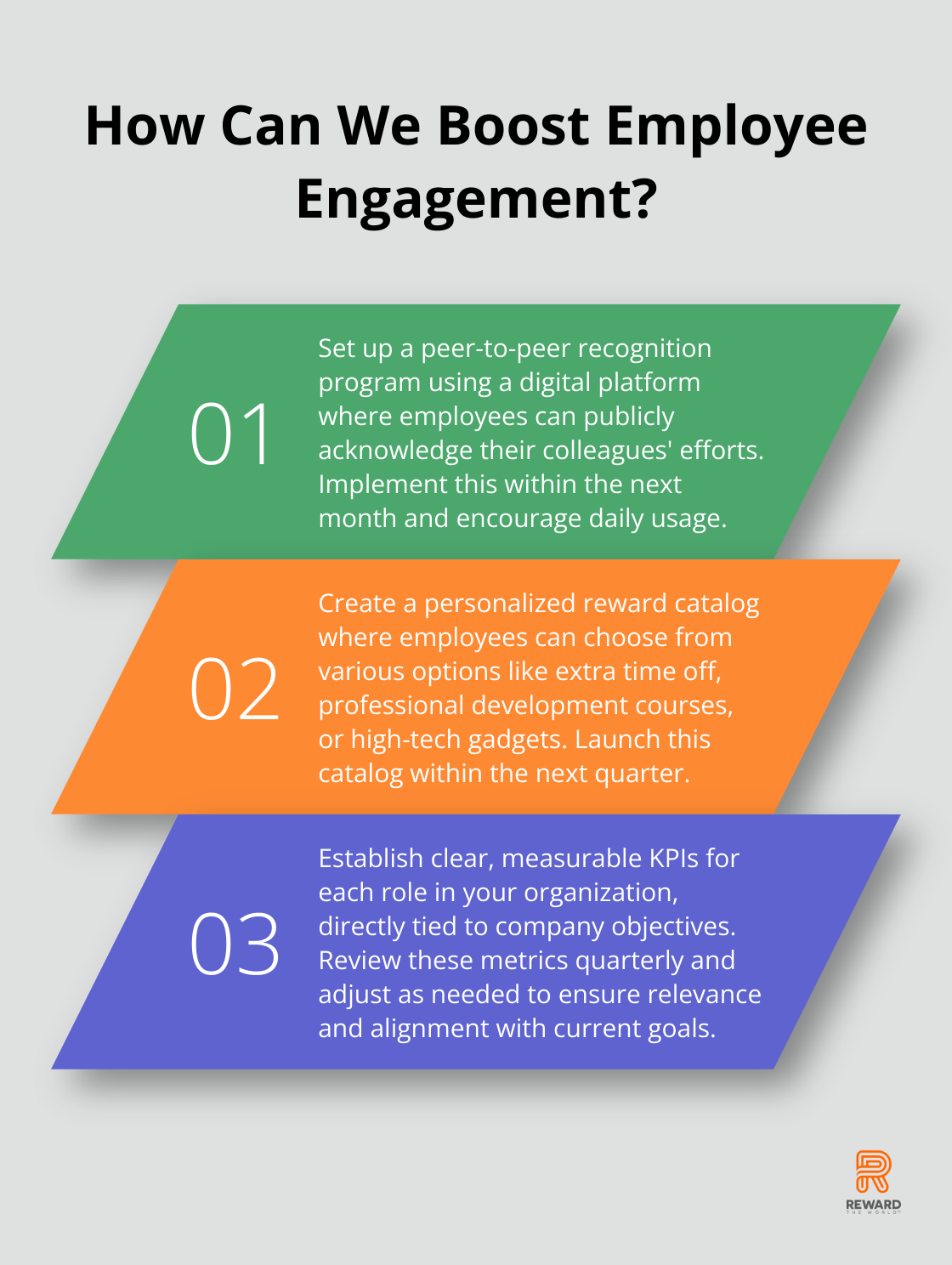
Employee recognition is a game-changer in today’s competitive business landscape. At Reward the World, we’ve seen firsthand how effective reward strategies can transform workplace dynamics.
Managing employee performance and reward concepts, practices, and strategies is crucial for fostering a motivated and productive workforce. This blog post explores the impact of recognition on employee engagement and outlines practical approaches to implement successful reward programs.
Why Employee Recognition Matters
The Power of Appreciation
Employee recognition transforms workplace dynamics. It’s not just about making people feel good-it’s a strategic tool that drives business success. At Reward the World, we understand the impact of effective recognition on employee performance and overall company growth.
Motivation: The Key to Engagement
Recognition fuels motivation. A Gallup study reveals that employees who do not feel adequately recognized are twice as likely to say they’ll quit in the next year. Conversely, when recognition hits the mark, employee engagement skyrockets. The Society for Human Resource Management reports that 79% of employees increase their work effort when they feel appreciated.
Productivity Soars with Recognition
Recognition doesn’t just boost happiness-it amplifies productivity. This translates to significant cost savings, as replacing an employee can cost up to 150% of their annual salary.
Fostering a Culture of Appreciation
Regular recognition creates a positive work environment. When employees feel valued, they value their work and colleagues more. A SurveyMonkey study showed that 82% of employees consider recognition an essential factor in their job satisfaction.
The Business Case for Recognition
Investing in recognition yields substantial returns. Deloitte reports that companies with effective recognition programs see a 31% reduction in turnover rates. Moreover, these programs can lead to a 50% increase in productivity and a 20% improvement in business outcomes.
Beyond Financial Rewards
While fair compensation remains important, non-monetary recognition often leaves a lasting impact. Reward Gateway found that 70% of employees believe their motivation and morale would significantly improve if managers simply said “thank you” more often.

Recognition isn’t just a nice addition-it’s a necessity for businesses aiming for long-term success. A robust recognition program creates a more engaged, productive, and loyal workforce. In the next section, we’ll explore various effective reward strategies to help you achieve these outcomes and elevate your employee recognition efforts.
Effective Reward Strategies That Drive Performance
The Impact of Monetary Rewards
Money remains a powerful motivator in the workplace. Bonuses, profit-sharing, and stock options can significantly boost employee performance when implemented strategically. A WorldatWork study revealed trends in compensation programs, including various forms of variable pay.

The key to success lies in linking bonuses to specific, measurable goals. For example, a sales team might receive a bonus for exceeding quarterly targets by 10%. This approach not only rewards performance but also aligns employee actions with company objectives.
Profit-sharing and stock options create a sense of ownership among employees. When staff members have a stake in the company’s success, they often go above and beyond their regular duties. However, a study by the National Center for Employee Ownership found mixed results regarding the performance of ESOP companies compared to non-ESOP public companies.
Non-Monetary Rewards: The Hidden Gems
While financial incentives matter, non-monetary rewards often have a more significant long-term impact on motivation and loyalty. Flexible work arrangements top the list for many employees. A FlexJobs survey found that 80% of workers would show increased loyalty to their employers if offered flexible work options.
Career development opportunities serve as another powerful non-monetary reward. Companies that invest in employee growth demonstrate a commitment to their staff’s future. LinkedIn’s 2018 Workplace Learning Report showed that 94% of employees would stay at a company longer if it invested in their career development.
The Power of Social Recognition
Public acknowledgment and peer-to-peer recognition programs have gained traction as effective reward strategies. These methods tap into the human need for appreciation and respect.
Many companies now use platforms that allow for instant, public acknowledgments, creating a culture of appreciation that boosts morale and productivity. (Reward the World stands out as a top choice among these platforms, offering comprehensive features for social recognition.)
A Globoforce and SHRM study found that peer-to-peer recognition is 35.7% more likely to positively impact financial results than manager-only recognition. This statistic highlights the power of fostering a community of mutual appreciation within the workplace.
Personalized Rewards: Tailoring to Individual Preferences
One-size-fits-all approaches often fall short in reward strategies. Personalized rewards that cater to individual preferences and values can significantly enhance their impact. These could range from extra time off for a nature enthusiast to a high-tech gadget for a tech lover.
An Incentive Research Foundation survey found that 81% of employees prefer personalized rewards. This approach not only increases the perceived value of the reward but also shows that the company values the individual, not just their work output.
The implementation of effective reward strategies requires more than just selecting the right types of rewards. It involves creating a comprehensive system that aligns with company goals, ensures fairness and transparency, and resonates with employees on a personal level. The next section will explore the practical steps for implementing such a successful reward program.
How to Build a Winning Reward Program
Align Rewards with Company Objectives
Define your company’s goals clearly. Your reward program should directly support these objectives. For example, if customer satisfaction is a priority, reward employees who consistently receive positive customer feedback.
A WorldatWork study found that 85% believe their employer prioritizes DEI a good or great deal in the workplace. This highlights the importance of clear communication about how rewards tie into company goals and values.
Set Clear Performance Metrics
Establish specific, measurable performance criteria for each role. Use key performance indicators (KPIs) that directly relate to job functions and company objectives. For a sales team, this might include metrics like conversion rates, customer retention, or average deal size.

Review and adjust these metrics regularly. What worked last year might not be relevant this year. Gallup reports that employees whose managers involve them in goal setting are 3.6 times more likely to be engaged than other employees.
Ensure Fairness and Transparency
Make sure your reward criteria are clear, consistent, and applied equally across the board. Communicate openly about how rewards are determined and distributed.
Consider implementing a peer recognition component to your program. The Society for Human Resource Management found that peer-to-peer recognition ranked behind recognition for “length of service” and for “above-and-beyond performance,” with 42% of employers surveyed using this approach.
Leverage Technology for Efficiency
Modern reward management platforms can streamline the entire process, from tracking performance to distributing rewards. These tools can provide real-time data on employee performance, automate reward distribution, and even offer analytics to help you refine your program over time.
(It’s worth noting that Reward the World stands out as a top choice among these platforms, offering comprehensive features for efficient reward management across multiple languages and countries.)
Train Managers in Effective Recognition
Equip your managers with the skills to recognize and reward effectively. This includes training on how to give specific, timely feedback, how to use your reward platform, and how to tailor recognition to individual preferences.
A Gallup study found that only 14% of employees strongly agree that the performance reviews they receive inspire them to improve. This underscores the need for manager training in effective recognition techniques.
Final Thoughts
Effective reward strategies form the foundation of managing employee performance and driving organizational success. Companies can create a culture of engagement and productivity through a mix of monetary incentives, non-monetary rewards, social recognition, and personalized appreciation. Continuous evaluation and improvement of reward programs ensure long-term effectiveness as workforce demographics and preferences evolve.

Investing in employee recognition yields tangible returns, including increased productivity, reduced turnover, and improved business outcomes. The impact of a well-executed reward program extends beyond individual performance, fostering a positive work culture and driving overall company growth. Managing employee performance and reward concepts, practices, and strategies has become more critical than ever in today’s competitive business landscape.
Reward the World offers a comprehensive solution for businesses looking to elevate their reward strategies and manage employee performance effectively. With its global reach, instant reward delivery, and robust analytics, it provides a powerful tool for companies aiming to boost engagement and performance. The investment in recognition today paves the way for a thriving, high-performing team tomorrow.
